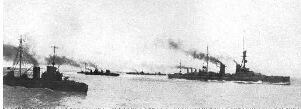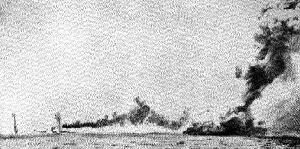Ingenohl's Glory - The Great War
1914
1915
January 1915
The planned Dardanelles operations are cancelled ; with Churchill gone from the Admiralty and Fisher in opposition to the plans the crisis caused by Dogger Bank (sic) has focussed the minds of the government upon the North Sea
In late January Ingenohl takes the High Seas Fleet to sea with the intention of seeking battle ; his secondary bombardment/shipping aims are intended to draw Jellicoe into the battlezone and succeed. In darkening conditions and with closing visibility the two fleets give battle. Sturdee, victor of the Falklands has the four remaining Royal Navy battlecruisers under his command and preliminarily engages in a losing running battle with Hipper's battlecruisers. The outcome of the hard-fought main action is a victory for Ingenohl and a crushing defeat for Jellicoe who goes down when his flagship is torpedoed
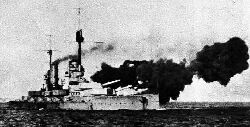
| 
| 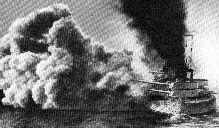
|
In London Asquith's government falls and is replaced by a Conservative-Unionist administration led by Bonar Law and including a few Liberals such as Lloyd George at the Exchequer . Balfour is appointed to the Admiralty and replaces Fisher with Beresford , bringing De Robeck in to command the remains of the Grand Fleet which is now stationed in the Humber.
February - June 1915
Italian prime minister Salandra's efforts to secure an alliance with the Entente are hit hard by the Royal Navy's defeats and a public strengthening of support for long-term neutrality. In June he loses a vote of confidence in the assembly and is replaced by convinced neutralist Giolitti
Within Greece King Constantine is fighting a similar battle with his pro-Entente premier Venizelios but with the Austro-German victories on the Eastern Front in late Spring/early Summer and the failure of Allied offensives in the West he feels strong enough to dismiss the prime minister and appoint a pro-German neutralist cabinet in Athens.
The German victories have seen the opening up of the North Sea and the break out of several light cruisers into the Atlantic where they begin short-lived but profitable and high-profile lives as commerce raiders. Merchant ships begin trying again to run the bloackade and the Hamburg-Amerika Line and Norddeutscher Lloyd Line both attempt a 'prestige' blockade-running service to America. This is suspended when the Imperator is attacked by cruisers in the Norwegian Sea and sunk with the loss of many neutral lives. The United States is particuarly heavy in its condemnation of the British action .
Within Germany the apparent success of the surface fleet approach to warfare has for the time-being seen off the submarine lobby and prevented the declaration of anti-submarine warfare they had been pressing for.
July 1915
Ingenohl under pressure due to the relative inactivity of the High Seas Fleet at a time when the British are receiving reinforcements in the first of the Queen Elizabeths sails on a punitive expedition against the Dover Barrage. Room 40 (British code-breaking and co-ordination head-quarters) has however intercepted the German plans and De Robeck sails to give battle in the hope that superior gunpower and surprise could make up for German numbers. However Hipper is scouting to the North in case of this eventually and Ingenohl is able to deploy his fleet to counter this intention. The battle is roughly even in terms of ships sunk and damaged and the bulk of the High Seas Fleet returns home.
In the aftermath of the Battle of the Channel Ingenohl is promoted to the Admiralty and Hipper takes his place in charge of the Fleet ; Von Paschewitz moves from the fleet's armoured cruisers to take command of the remaining battlecruisers.
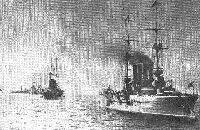
| 
| 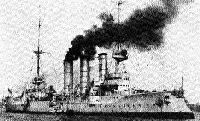
|
August - December 1915
The North Sea theatre becomes a place for action between light ships as neither Britain nor Germany can put a fleet to sea during the Autumn months. German cruisers bombard East Anglia but suffer losses to mines , while an increasing number of blockade-runners are escorted by German light cruisers who fight several engagements against British interdiction forces. Submarines of both nations play an ever increasing role ; the British move to torpedo merchant ships entering and exiting the Bight incites fury among neutral nations but Britain claims it is only extending the Blockade by other means. Tirpitz vetoes the German submarines from acting in a similar manner pointing to the great propagnada boost that Germany is receiving
With the Western Front dead-locked and the fleet reduced by its many losses, Bonar Law's government increasingly turns towards the idea of attacking the Central Powers where they are weakest - namely the Ottoman Empire, an idea whose greatest proponent is Lloyd George. Thus the Mesopotamian and Sinai Fronts are reinforced with Australian, New Zealand, African and Indian troops in preparedness for major offensives the following Spring.
Bulgaria declares for the Central Powers and invades Serbia from the South while Mackensen leads Austro-German forces from the North. The Serbs retreat into Albania losing many of their forces to the mountains and disease, and to alleged Montegrin treachury. British and French Meditereanean naval units suffer serious losses to Austrian light forces and submarines as they extricate the remaining Serbs to Malta, before their eventual deployment on the Western Front .
Greek forces move into Southern Albania whilst Italy and Austria come to an agreement to share the remaining area at least for the duration of the war.
In London Ramsay MacDonald's pacifist wing of the Labour Party is beginning to make itself heard, especially when news reaches the capital of defeats in Mesopotamia and failure of yet another offensive on the Western Front. In response Bonar Law's government increases controls over industry and aspects of social life in order to maintain Britain's commitment to the war effort .
Britain concludes the secret Treaty of London with Japan, promising Japan unlimited economic and political penetration of China, occupation of Shantung and Manchuria, and ownership of Tsingtao and the North Pacific German colonies after the war. Japan in return is to take over many duties in the Mediteranean where British strength has been hit especially hard by the Albanian operation and by an attack by Souchon in the Goeben upon the weakened forces blockading the Dardanelles, inflicting serious losses before retiring. Britain has also recalled many of its more modern vessels to the North Sea and France is being over-stretched especially now that German and Austrian submarines are beginning to operate in large numbers.
1916
January 1916
De Robeck makes the first British offensive manoevre in the North Sea for some time, taking out the Grand Fleet now led by all five 15"-gunned Queen Elizabeth's and attacking and sinking several blockade runners and their escorting light cruisers. Blockade-running decreases after this and a period of uneasy inactivity occurs.
February - June 1916
British & Imperial attacks in Mesopotamia and Sinai begin ; Kut is relieved in Mesopotamia but reinforcements under Kemal halt the advance along the Euphrates. British advances across the Sinai are swift and they are soon threatening Southern Palestine. Mackensen is transferred from the Balkans with veteran German units to halt the advance and succeeds in holding Gaza in the course of three bloody battles.
In the Hejaz British intrigues and promises of support cause Sherrif Hussein to declare the beginning of the Arab Revolt.
Japanese naval units begin to arrive in the Eastern Mediteranean in strength, led by several predreadnought battleships and semi-battlecruisers, and including armoured cruisers, ex-Russian protected cruisers and many of Japan's available destroyers.
Brusilov's assault on Austria-Hungary achieves initial success but Austrian reserves coupled with German counter-strikes throws him back , whilst in the North Russian assaults are half-hearted and easily defeated . The Russian army begins to break apart in the aftermath of successive disasters.
The Easter Rising in Dublin exacerbates the pressure upon Bonar Law and his government
July 1916
The Verdun Offensive in the West is fully launched, with initial German success being checked once Petain arrives to take command of beleagured French forces. Among the measures he adopts is the use of the Serb Army group to plug the gaps in his lines.
Hipper, alarmed at how the Grand Fleet is apparently reclaiming command of the North Sea takes the High Seas Fleet out in full force. Once again Room 40 keeps De Robeck informed and the Grand Fleet meets Hipper as he heads for the Thames Estuary aiming to make a show of force and retire. The Battle Of The Nore is a defeat for the High Seas Fleet ; Von Paschewitz and his battlecruisers are lost, whilst several other dreadnoughts go down. Hipper's extricating the fleet for the jaws of death and the destruction of the R-class Royal Sovereign are the German compensation but the Kaiser is furious and forbids the fleet form sortying again, Tirpitz resigns in protest and Ingenohl succeeds to the highest position in the Admiralty.
August - December 1916
The Kaiser gives in to the submarine lobby and unrestricted submarine warfare begins in August. The sinking of the Mauretania with the loss of several American lives leads to a furious response from US President Wilson and in December the Kaiser orders the campaign halted. While it had been in effect it had been having a serious impact on British political life ; Bonar Law is forced to reshuffle his government and brings in several major industry figures to help co-ordinate the war effort.
In Mesopotamia Kemal, reinforced by more German units now under Limann Von Sanders, defeats the British & Imperial forces outside Baghdad and forces them back to Kut
Mackensen stands on the defensive in Palestine and sends Kressenstein South with a considerable force and the Arab Revolt in the Hejaz begins to falter as the attempt to take Medina is defeated by the Turko-Germans who them move onto the offensive.
1917
January -April 1917
German-Turkish advances on Mecca cause Hussein's armies to retreat to the South and West. Britain lands mass reinforcements at Jedda to try and stabilise the front
There is Revolution in Saint Petersburg/Petrograd and the overthrow of both the Tsar and the Russian monarchy. A liberal-socialist government under Kerensky takes power.
On the Western Front the Nivelle Offensive is an unmitigated disaster leading to crisis within the French army as order breaks down and a wave of strikes and mutinies spread across the Front. Petain is instrumental in preventing a general collapse but the offensive capability of the French army is shattered for the time being
In Mesopotamia Kemal and Limann Von Sanders inflict another defeat upon the British & Imperial force, laying siege to Kut for a second time. Bonar Law's government commits vast numbers of Indians and ANZACs (as they are becoming known) to the front.
May - October 1917
Mid 1917 sees the Russian Kerensky government's last attempt at offensive action on the Eastern Front - a decisive failure which leads indeirectly to the Bolshevik Revolution within Petrograd within October/November 1917 .
The most severe fighting of the Autumn/Fall of 1917 is in Sinai/Palestine and Mesopotamia with large-scale British and Imperial reinforcements on both fronts attempting to overcome the defensive positions and tactics of the German-Turkish forces.
Within the German High Command changes occur ; Falkenhayn , whose position has been under threat since the failure of the Verdun Offensive a year previously is manoevred out by Ludendorff and Hindenburg and accepts redeployment to the Mesopotamian front, bringing substantial reinforcements with him as he takes over command in the theatre.
The assumption of the Supreme Command by Hindenburg and Ludendorff leads to a political change within Germany. Bethmann-Hollweg's government falls and is replaced, after a round of negotiations and much uncertainty, by Hertling's administration.
Serb units on the Western Front have greatly expanded their role and presence, plugging the gaps in the French lines caused by the mutiny, which by late Summer has died out.
November - December 1917
Russian forces on the Eastern Front are melting away in the light of events in the rear , and German and Austrian forces advance into areas previously heavily defended by the Russians. In December German forces take Riga in a combined operation which sees the 15"-gunned dreadnoughts Baden and Bayern blast their way into the Gulf and assault the city from the seaward side (albeit at a loss of several destroyers and mine damage to the Baden)
1918
January - April 1918
Allied intervention in Russia sees Anglo-French landings in the Arctic - Murmansk and Archangel , and a largely Japanese landing at Vladivostock pushing West into Siberia in order , in the first instance , to link up with the Czech Legion and establish Kolchak's anti-Bolshevik government at Omsk.
Late Spring 1918 sees the first German Offensive of what becomes known as the Kaiserschlacht . The switch of divisions from the Eastern Front has strengthened the forces of the Prussian & Imperial Crown Prince Wilhelm in Alsace-Lorraine and of the Bavarian Crown Prince Rupprecht in Flanders. The initial attack is by Kronprinz Wihelm and drives the Allies back in some confusion before the Foch is able to rescue the situation , plugging the widening gap between the French and British forces with the Serbs and stabilising the line.
In the East , with German forces advancing on Reval , Lenin prevails over Party comrades to get signed the Treaty of Brest-Litovsk in order to cease hostilities with the Central Powers and be free to focus upon internal enemies. Russia cedes huge territories to nominally independent states largely under the control of the Germans.
Germany has troops in Finland fighting the Reds and helping to establish the basis for a monarchy under a prince of Hesse-Kassel. German political bodies in Lithuania similarly press for the establishment of a 'Greater Lithuania' under a Wurrtemburger prince in order to counter post-war Polish power .The Ukraine is guaranteed independence as well as a province of imperial Russia that Polish delegates feel they have a greater claim to. Turkey annexes Kars and Batum in the Southern Caucasus. German troops enter the Northern Caucasus.
In the light of developments in the Caucasus the fighting in Mesopotamia takes on an increasing importance. Falkenhayn and Kemal hold off a mass British & Imperial advance and in turn secure control over an area of North-Western Persia.
Kressenstein lays siege to Jedda whilst Mackensen fights a number of indecisive battles against Allenby in Sinai/Palestine.
May - August 1918
The addition of the Sachsen and Wurtttemburg and the first Mackensens (Mackensen and Graf Spee) to the High Seas Fleet by the early Summer leads to a renewal of the offensive spirit of early in the war. Hipper is promoted to replace Ingenohl at the admiralty and Boedecker takes over command of the fleet.
Britain has begun to institute semi-convoys across the Southern North Sea as a measure designed against German cruiser/raider attacks and Boedecker leads the High Seas Fleet out in July against one of these. decimating its defenders and sinking the majority of merchant vessels
July 1918 sees the resumption of Germany's mass offensive on the Western Front using divisions freed from the Eastern Front. Despite the initial failures of the earlier operation in the late Spring the German position is an advantageous one as the Allied line has been spread thin and the positions they occupy are not as entrenched as those previously held. Ludendorff orders a dual offensive with the Crown Prince in the South receiving additional Austrian units and Prinz Rupprecht in the North several veteran German units.
Both attacks achieve initial breakthrough, Haig retires the Northern command slowly towards the Channel , losing contact with the French in the centre though this is temporarily patched up by the use of the Serbian forces on that front. The French retreat becomes a rout as Ludendorff switches all reserves to the Kronprinz's army (incidentally allowing Haig to stabilise his front in Artois). The Serbs are defeated and the French army driven Westwards as the German Crown Prince advances on Paris.
The French government flees to Bordeaux and US President Wilson makes a public offer to mediate - this is turned down by the Germans and publicly denounced by the British though the position of the French government is unclear.
Clemenceau resigns amidst huge acrimonious scenes and Painleve's recalled government attempts to negotiate an armisitice with German forces who now surround Paris on three sides as well as threatening British positions from the South as well as the East.
Against direct orders from the Third Supreme Command Crown Prince Wilhelm accepts Painleve's offer of a localised armistice, gambling on the hope that once French forces cease fighting they will have no stomache to resume the war. Riots and civil disturbances in Paris and other French cities appear to confirm his belief as he leaves representatives to deal with the French politicians and swings the majority of his forces Northwards in conjunction with Rupprecht's renewed offensive from the East.
The Serbian forces have retreated Southwards towards Marseilles and no longer constitute a major force in the equation, whilst the Portuguese corps on the Northern front have been all but decimated by the force of the German advance.
September 1918
Haig has withdrawn Northwards towards the Channel, keeping the Belgians on his flank and shortening his front against the twin forces of the Crown Prince's and Rupprecht's armies.
In Paris General Sarrail is appointed Prime Minister in place of Painleve and proceeds to bloodily suppress the riots gripping the city.
Serb forces enter Marseilles as they continue to move Southwards. They assist the local French commanders in restoring order.
In Rome the Japanese Ambassador makes it clear to the German ambassador (Von Bulow) that his government is interested in making a separate peace on the basis of Japanese gains in the Far East although he hints that the future status of Tsingtao is open to negotiation. Hertling instructs Von Bulow to agree to formal talks.
Haig is pinned back upon the Pas-de-Calais area. His position is further weakened when Albert of Belgium makes it clear that he is willing to sign a separate peace providing the future independence of his country is recognised.
In London Prime Minister Andrew Bonar Law meets with the leaders of the dominions to discuss the general crisis within the alliance. News of Japan's defection rocks the die-hards and it is agreed that US President Wilson's offer to mediate be looked into seriously.
October 1918
Initial peace moves between London and Berlin begin with US intermediaries discovering the two sides basic positions. It soon becomes clear that Germany is unwilling to sign anything which does not include ratification in full of Brest-Litovsk, guarantee of the territorial integrity of the Ottoman Empire and the return of German colonies over-run by British and dominion forces. For their part Britain lays down its minimum terms - no reparations, no conditions with regard to the fleet, no break-up of the empire, and the recognition of Belgium as an independent state.
Bonar Law's government agrees to the German requirements. In Berlin Hertling manages to carry the Reichstag in agreeing to the British needs, despite the opposition of the Third Supreme Command. The Queen of Holland offers The Hague as a neutral venue for the completion of talks.
In Paris, Prince Leopold of Bavaria (a veteran of the Spring's Brest-Litovsk negotiations) meets with Sarrail's deputy and agree the basic terms for a formal armistice ; French forces are disintegrating daily but the German position is far from secure with the bulk of their armies in the North facing off against the British.
October 12th sees the Paris Accord signed between Germany and France , designed to halt hostilities and lay the foundations for a later peace treaty in full ; France agrees to return all conquered German colonies and make adjustments to frontiers in Central Africa to Germany's favour, she will ratify Brest-Litovsk and formally cease her alliance with Russia as well as withdraw at once all troops from the Arctic, she agrees to the cession of Morroco to Germany and Tunis to Italy and to German occupation of the Briey ironfields for a period of fifteen years. Conflict within Sarrail's delegation over the latter point had seen one of the army officers shoot and kill a civilian minister in a presumed duel , something that both Sarrail and the Germans manage to hush up.
In The Hague the British delegation is led by the badly-wounded Winston Churchill whose post-admiralty career had been spent in active command on the Western Front where in the Spring offensive of 1918 he suffered severe leg wounds from shrapnel ; he is barely recovered and walks with a stick.
In Rome Von Bulow puts the finishing touches to the treaty with Japan ; it ends hostilities at once and guarantees German recognition of Japanese occupation of Shantung and Southern Manchuria, plus their prime influence in China as a whole. Japan in turn agrees to return Tsingtao and one or two of the Mariannas though she will keep the rest of her conquests. Japanese forces are withdrawn from the Mediteranean immediately. Von Bulow journies to The Hague to take over the running of Germany's mission there.
On October 31st a formal armistice between Germany and Great Britain is signed in The Hague. Under joint American-Dutch supervision the Congress of The Hague begins in earnest on 3rd November 1918.
Haig's forces are withdrawn from the Pas De Calais and Rupprecht's army retreats South-East towards the frontier, the majority to be transferred East over the next few months.
In the Hejaz Hussein has been driven South and Allied units besieged in Jedda ; the armistice finds Mackensen and Kressenstein in control of most of the theatre.
Kut was still holding out on 31st October ; with the armistice Falkenhayn and Kemal allow the British and Imperial garrison to retire South but retake the now undefended city.
In London Prime Minister Andrew Bonar Law offers the resignation of his government to the King but is ordered by King George V to remain in power at least until the peace is signed.

